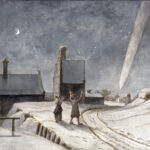23 October 1679: Presbyterian emotion at Gisburn, Ribble Valley (West Riding)
Oliver Heywood. 1881. The Rev. Oliver Heywood, B.A., 1630-1702, Vol. 2. Ed. J. Horsfall Turner. Brighouse: A.B. Bayes. Get it:
.Unedited excerpt
If an excerpt is used in the book, it will be shorter, edited and, where applicable, translated.
5th day [i.e. Thursday] I preached at John Hey’s to a full assembly, God wonderfully helped in prayer, such tears, groans, that sometimes my voice was scarce heard for the noise of people’s cries. I have seldom heard the like – a good sign.
Comment
Comment
Unfortunately 17th century charismatic Presbyterian preachers didn’t use YouTube. What rather puzzles me is Heywood’s use of “melt”. Is it OED’s 3.c. – “transitive. To overwhelm, touch, or soften (a person, a person’s feelings, etc.), esp. by appealing to pity, love, etc.; to persuade, bring round; to delight, thrill” – or its 3.e. – “intransitive To become ecstatic; to yield to rapture or delight; spec. to experience sexual orgasm”? OED doesn’t seem to have the noun form, “melting.” Private and public examples in diverse functional contexts ex op. cit.:
- God wonderfully melted my heart when Jo Lister and myself were at prayer
- God sweetly melted my heart, helped me in discoursing extempore on Psalm 56.8
- God helped my heart, melted several others
- God wonderfully assisted my head in my Lord’s work, melted some hearts when speaking of this work in young men
- God melted my heart in secret prayer in the morning
- In the afternoon, my son, wife and I spent some time in prayer, all excercised, wonderfully melted, oh what a flood of tears!
- Eliezer prayed sensibly, but John exceeded in self-abasings, meltings, tears
Something to say? Get in touch
Similar
 11 December 1680: The Great Comet is seen in Halifax as a natural event, in London – amid Popish Plot hysteria – as a portent
11 December 1680: The Great Comet is seen in Halifax as a natural event, in London – amid Popish Plot hysteria – as a portent 27 July 1612: Jennet Preston, the only Yorkshirewoman among the Pendle witches, is found guilty at York of the murder of Thomas Lister of Westby Hall, Gisburn (Ribble Valley)
27 July 1612: Jennet Preston, the only Yorkshirewoman among the Pendle witches, is found guilty at York of the murder of Thomas Lister of Westby Hall, Gisburn (Ribble Valley)
Comment
Comment
I take this to be a curious prayer. The context is the 1673 Test Act and suspicion that James was a Catholic – he had married an Italian Catholic, Mary of Modena, six days previously, on 23 November. Is James the “false brother” AND “friend”, or is someone else implicated?
Something to say? Get in touch
Search
Donate
Music & books
Place-People-Play: Childcare (and the Kazookestra) on the Headingley/Weetwood borders next to Meanwood Park.
Music from and about Yorkshire by Leeds's Singing Organ-Grinder.


 Bluesky
Bluesky Extwitter
Extwitter